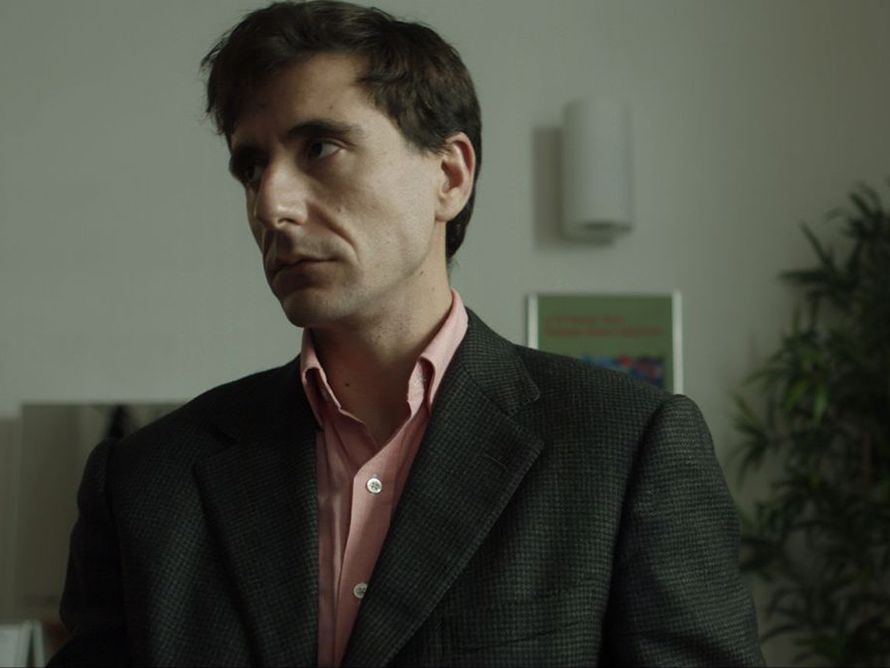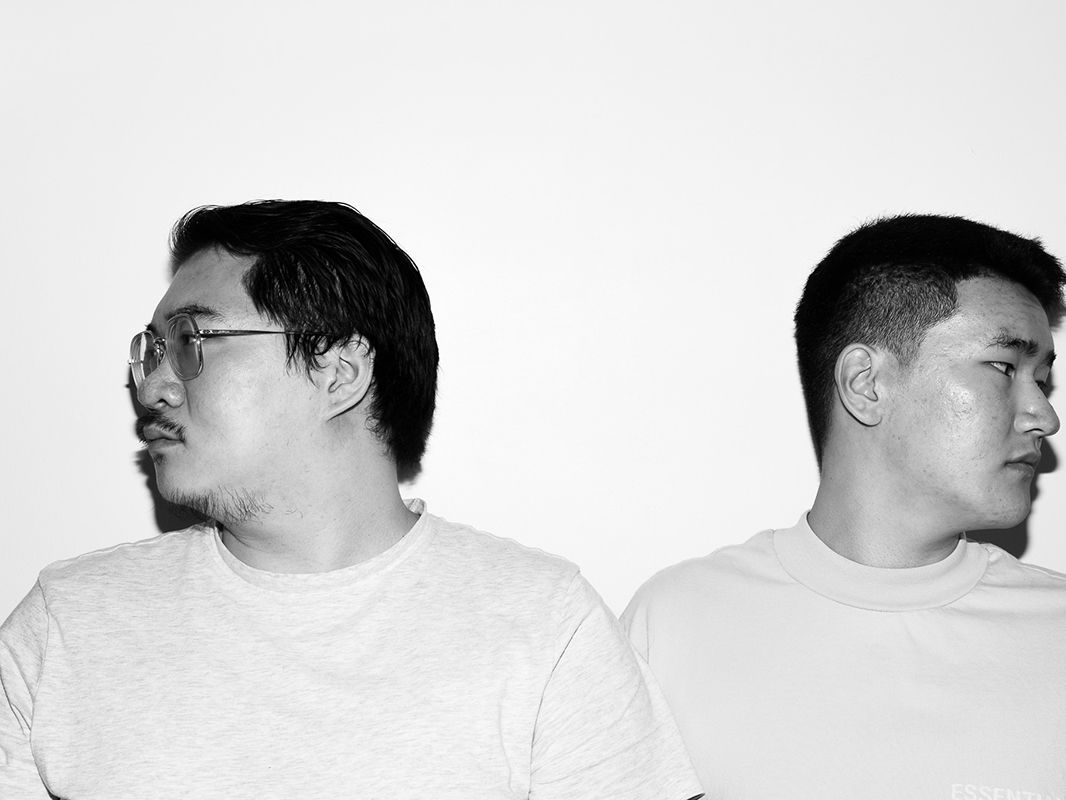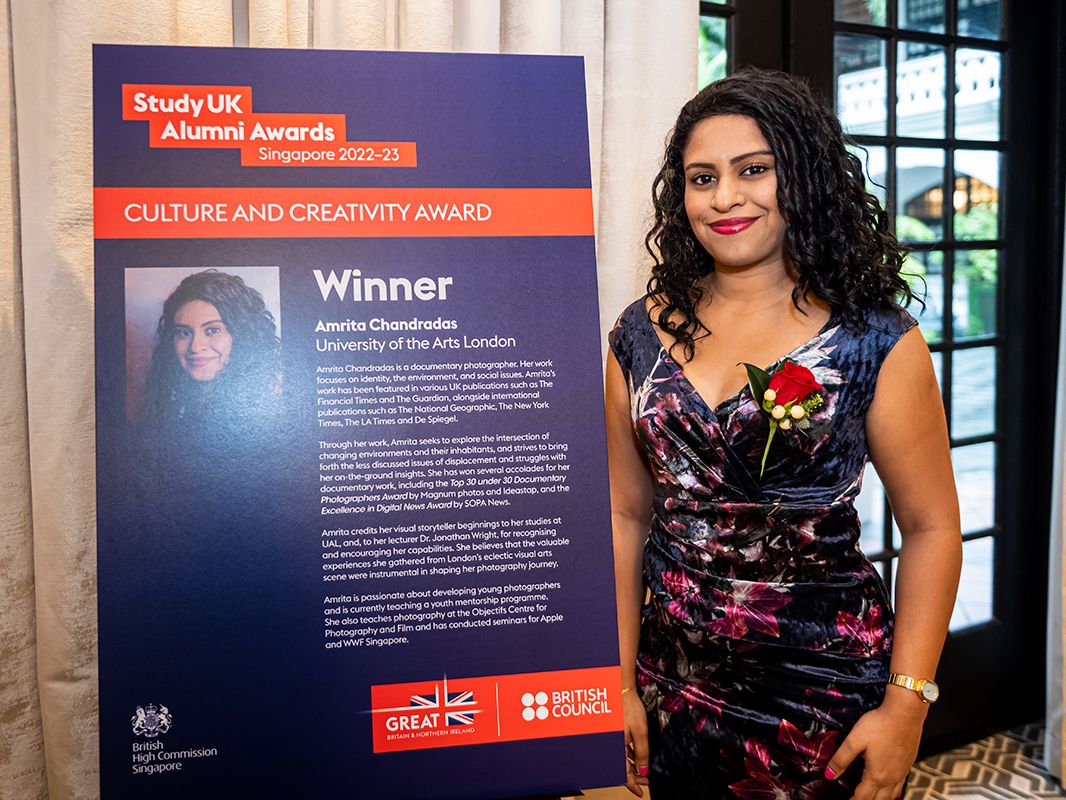
MA Journalism students discuss social issues and narratives at Global Refugee Forum
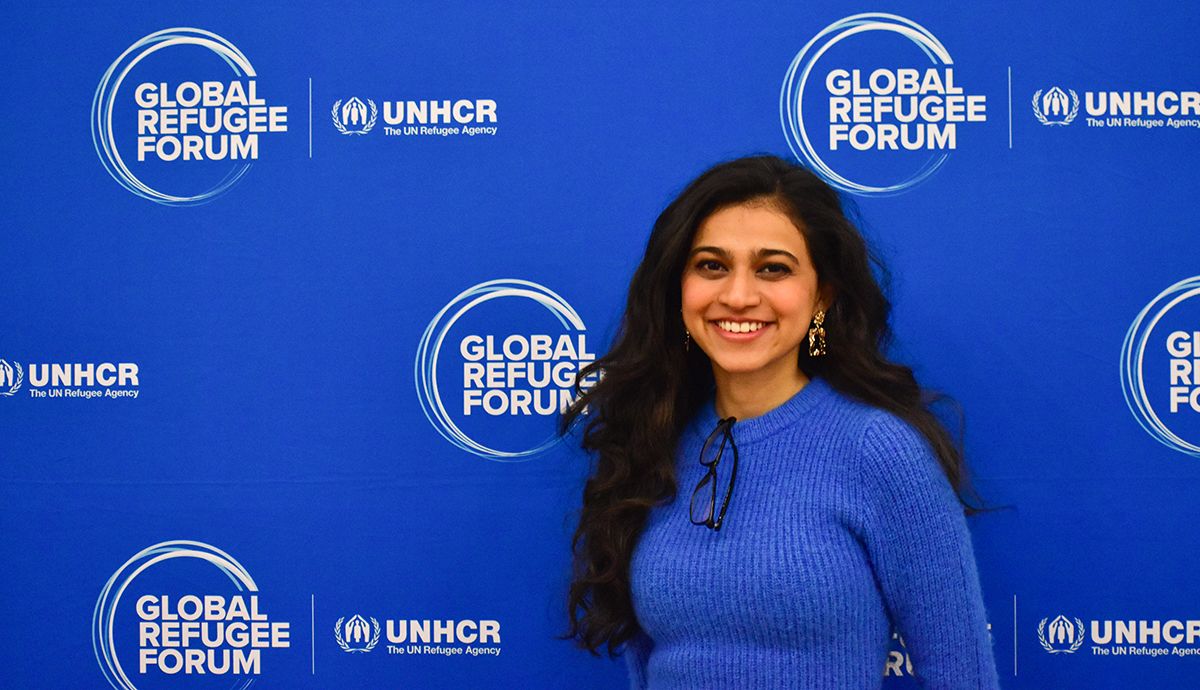
- Written byChloe Murphy
- Published date 24 March 2024

Journalism centres on the exploration of lived experience – both of those who research, write and develop published work, and of those who generously provide a window into their own lives.
At London College of Communication (LCC), our MA Journalism course enables students to develop the intellectual rigour and practical skills needed to build strong, successful careers within – and beyond - the media industries.
Working across 1 of 3 strands of specialism – Arts and Lifestyle, Audio and Video or Social Justice – they learn how to tell stories that reflect the ways in which we live, work and perceive ourselves as they explore how journalism can make the word a better place.
In December 2023, MA Journalism students were given the opportunity to explore key issues in social responsibility at the UNHCR Global Refugee Forum in Geneva, Switzerland, where they were able to engage with insights offered by a broad community of stakeholders, policymakers and those who have themselves experienced displacement.
Held every 4 years, the Global Refugee Forum is the world's largest gathering to facilitate the discussion of pressing topics in the displacement space and emphasises the importance of action, unity and impact. The 2023 iteration of the event welcomed over 4,200 participants from 168 countries, which ranged from ministers and heads of state to representatives of civil society, international organisations and CEOs of international business and foundations.
Over the course of 3 days, students were able to engage with a programme of discussions and panel events that resulted in over $2.2bn in pledges to improve the lives of refugees and host communities through support for refugee entrepreneurship, skills training, pro bono legal services, financial products and connectivity, as well as improved access to climate action for refugees, displaced and stateless people, and their hosts.
They were also able to engage with a multi-stakeholder pledge on digital protection from governments, the private sector, civil society, the UN and other actors to help prevent the harmful impact of hate speech, misinformation and disinformation.
"United by a solid will to change the world"
Syrian-Algerian journalist Houda Fansa highlighted the importance of the Global Refugee Forum in cultivating spaces that enable those with lived experience to feel safe, respected and heard.
“The connotation of the word refugee is often negative and mainly perceived as a weakness or with sympathy – but in Geneva, I felt that this was my place,” she said.
“I didn't feel the imposter syndrome that I usually feel. I was comfortable being there, participating and expressing my views and discussing with others.
“I needed to attend these conversations that are held about people like me to listen to policies, debates and perspectives from very important people. It was important to see people from around the globe united by a solid will to change the world and flip the negative narratives.”
"Understanding depth and complexity"
Dr Vivienne Francis, recently appointed Director of One World Media and former Senior Lecturer in Social Justice Journalism at LCC, explained the significance of facilitating opportunities for students to attend international forums on issues relating to social justice.
“At a time when global events are forcing millions to seek refuge, it’s important to offer our journalism students the opportunity to understand the depth and complexity of these issues,” she said.
“Not only is it important for them to gain insights by hearing directly from global actors, but also by learning how to consider migration from a solutions-focused perspective.”
We caught up with one of the students who attended the Global Refugee Forum, MA Journalism: Arts and Lifestyle Journalism student Miette Dsouza, about her experience of engaging with international opportunities, the transformative power of cultural work and her top tips for prospective students.
Welcome to the 2023 Global Refugee Forum | UNHCR
Tell us about your creative practice.
My journalism has always had a social justice element to it. Coming from a country where caste and religion are used to discriminate against others and used as an excuse to curtail human rights, it feels like the onus is on me to help people who cannot help themselves.
My focus has always been on minority communities, small businesses and disability, while the aim of my work is always to uplift the communities I’m writing about while educating my audience through the realm of arts and lifestyle.
Why did you decide to study for an MA in Journalism, and why did you choose to do so at LCC?
On my BA degree, almost all the articles I wrote explored arts and culture, and I realised that’s where my interest lay. I wanted to shift away from a more news-focused style of writing and explore long-form features that could help me to achieve my aim of being a culture writer, so I decided to pursue an MA in Arts and Lifestyle Journalism to learn how to achieve my dreams.
Apart from UAL being the only university in the UK that offers my particular course, I’ve found that it’s an apex institution with a stellar faculty that produces journalists of a high pedigree. Hence, I felt like applying to a top-tier school that specialised in the arts was a step in the right direction.
LCC’s prime location was also specifically a key selling point for me. Being situated in London, I felt that the opportunities available to expand your portfolio were unparalleled, and this has turned out to be the case: I’ve been able to attend London Fashion Week and Graduate Fashion Week as press, for example, which was amazing.
The opportunities offered by the College have been such a perk as we’ve had chances to intern at the Daily Express, create a social media strategy for The News Movement and create content for external organisations like the Green Finance Observatory.

How did you first find out about the opportunity to attend the Global Refugee Forum?
Alongside a few students in my cohort, I contributed an article to the LCC-run magazine, Food Crisis. Titled Living on the breadline, it explored the plight of refugees in the UK who were struggling to make ends meet during the cost-of-living crisis.
A few months after the success of the magazine, we were contacted and encouraged to submit a 300-word application detailing why our past experiences and ambitions had prepared us to cover the GRF 2023.
Why did you decide to get involved?
After doing my research about the GRF 2019, I felt that the aims of the event aligned with my ambitions aligned. I felt that covering an event like the GRF was important and would allow me to be at the epicentre of change where important decisions are made.
Having previously written articles about refugee issues ranging from the lives of North Korean defectors in the DPRK and the drop in asylum seeker acceptance rates in the UK during Covid-19, I felt like reporting on pledges as well as covering refugee voices would help me to expand my horizons journalistically.
Tell us about the trip – what kinds of activities did you take part in?
As part of the trip, I was able to attend several panel talks. My particular favourites were a talk on the inclusionary measures taken by organisations like UEFA, Warner Brothers Discovery Sports and Adidas on the inclusion of refugees in sports, and another on the importance of refugee education.
I interacted with several refugees, politicians and teachers, along with the owners of startups and charities. I even had the chance to conduct interviews for potential articles with fellow attendees, which was fantastic.
The trip also enabled me to attend the Nansen Awards 2023, where I had the opportunity to hear about the amazing efforts of refugee activists from all over the globe.
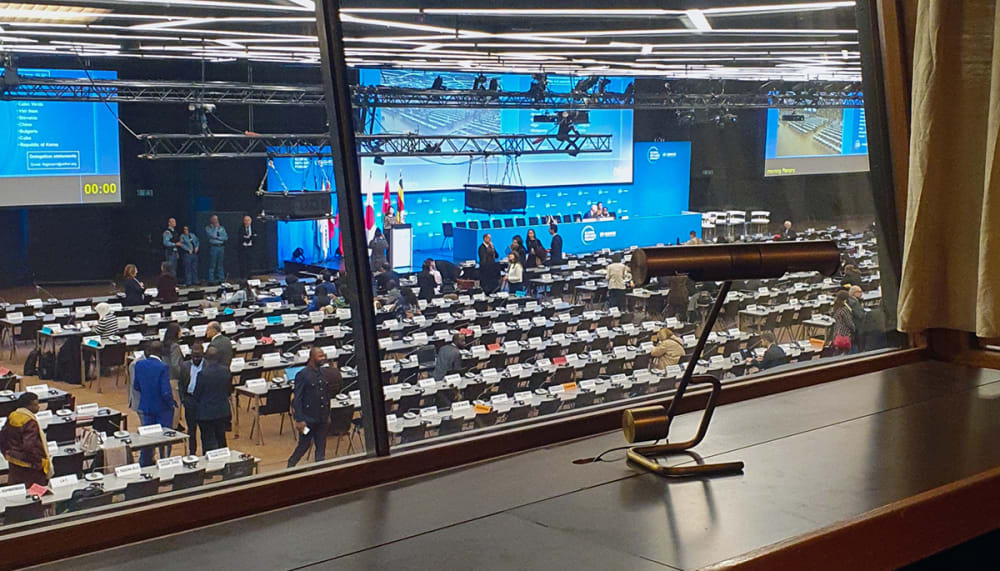
What were some of your highlights of the opportunity?
I was particularly blown away by Chairman of the Saudi e-Sports Federation, Prince Faisal, who talked about the inclusion of refugees in digital sports like gaming. This was an aspect of the issue I’d never even considered and was truly eye-opening. Sports has also never been my niche so learning about new unexplored territory was quite exciting.
I especially loved working alongside refugee journalists who were covering the GRF through LCC’s Refugee Journalism Project. This experience truly helped me to understand the ‘nothing about us, without us’ slogan. It showed me how important it was for stories about refugees to be told by people who have lived experiences of such crises as they better understand the issues and bring a unique perspective. The refugee journalists put their hearts into reporting about such issues, and being a small part of the process and seeing their passion was such a gift.
The Nansen Awards were beautiful ,and definitely became a night that has since been etched into my memory. Besides Lous and the Yakuza killing it on stage and gaining a new member of their fanbase (aka me), I loved Abdullahi Mire’s acceptance speech when he won the UNHCR’s Nansen Award for championing refugee education in Kenya. His humility, hard work and hopefulness for the future were reflected in his words. It was so heartening to see how his words resonated with our fellow attendees.

How did the trip reflect some of the themes you’ve been exploring on your course?
I’ve written articles about minority communities, small businesses and disability issues throughout my MA, and have always been keen to uplift and educate my audience. This was exactly what the trip provided me with an opportunity to do once again, which also helped me to discover a distinct pattern in my work.
More than anything, the trip showed me how writing about arts and lifestyle can have a place within refugee issues. I began the course thinking this style of journalism was extremely ‘fluffy’; however, over time, my perception has changed. This trip really solidified how arts and lifestyle pieces can be whipped into hard-hitting journalism that can serve as a call to action.
How has the experience prepared you for the next step in your career?
This trip acted as a bridge between my education and the corporate world. It helped me put all the skills I was taught in my MA degree to use – be keeping media ethics in mind while interviewing refugees on sensitive issues right down to networking. Overall, it made me feel like a real journalist: I finally felt comfortable eliminating the prefix of trainee from my role.
It’s also definitely strengthened my niche. Having never attended a forum like this before, I was extremely grateful to have been selected as it gave me a peek into a world I’d like to see my career move into. The experience has helped me to understand how important it is for young people like me to get more involved at conferences which are the focal point of change.
I also had to employ my time management and problem-solving skills since the conference hosted multiple panel discussions and I needed to prioritise the tasks on hand. These are skills I have also been taught throughout my degree, and have been sharpened by my time at the GRF which I feel has made me a better journalist.
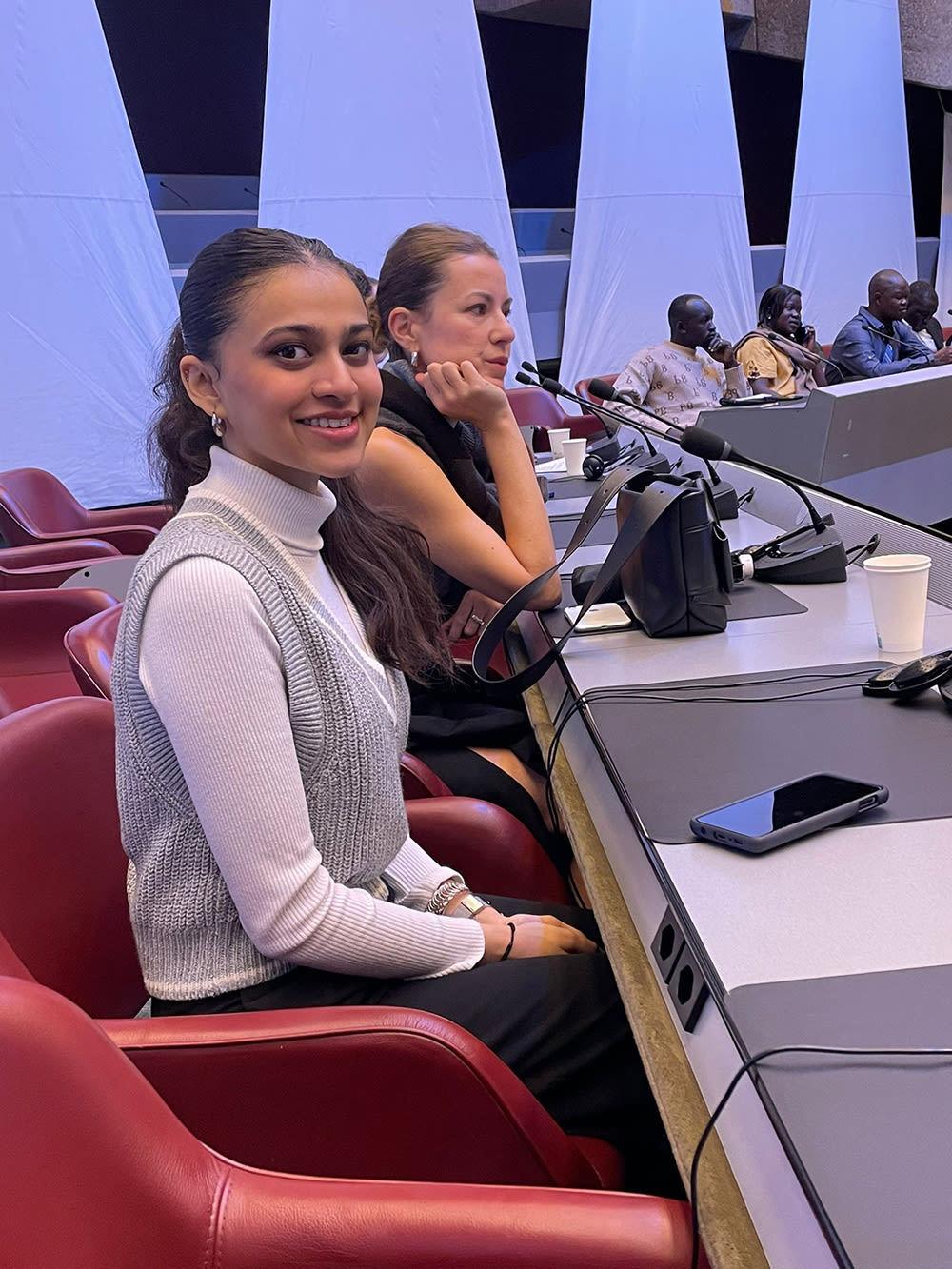
What have you most enjoyed about your time at LCC so far?
The opportunities that LCC has provided have been unparalleled. I’ve loved the fact that I can always get stuck into different activities both inside and outside the classroom – whether working for The News Movement, creating content for Food Crisis magazine or even helping external organisations make social media video content.
I’d also have to say that the continuous support and guidance from my tutors has been so encouraging. Their advice and kind words were always ready to catch me whenever I’ve felt apprehensive or unsure.
What are your top tips for prospective students who are interested in the world of journalism?
I’d say that you should grab every opportunity with both hands. You don’t know what doors your hard work of today will open for you tomorrow. When I decided to contribute an article for Food Crisis, for example, I never knew I was going to get the chance to attend the GRF! One article can change a lot in your career as a journalist - whether it’s the beginning of a blossoming rapport with important editors, or whether your article brings home an award.
If you’re thinking about attending LCC for journalism, do it. London is the place to be as a journalist because opportunities both inside and outside the College are overflowing. All you have to do is reach out and take them.
I’d also suggest using your journalism course to explore your niche. You may know which direction you want to take with your work, but I think you also need to be open to change.
Related links:
- Find out more about the Global Refugee Forum.
- Learn more about MA Journalism at LCC.
- Explore the work of our Media School.
